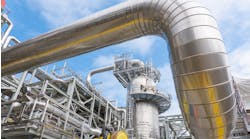Analysts have not recognized the devastation a terrorist threat on the world oil supply could cause during this current environmental climate. While natural disasters are unavoidable, other threats are not, and it is time for the industry to address those vulnerabilities that can be controlled.
It is plain that the delivery of energy is essential and that the security surrounding this process is of paramount importance. The effects of hurricane Katrina prove that our capacity to deal with a major disruption to the oil and gas supply cycle is already stretched and, with energy consumption continuing to rise, the impact of any supply problem will become greater.
Energy reserves at existing production sites are dwindling. This means that future production increasingly will come from new sources, many of which are located in politically inhospitable regions.
These increased threats come in many forms. They might be from terrorists (both international and national), activists, pressure groups, disgruntled employees, or criminals, whether organized hackers, or opportunists. Likewise, these threats can come from insider activity, external action, or insiders colluding with external adversaries.
One can see a huge risk with shipping alone. Seventy-five percent of the world’s oil and gas is transported through five shipping lanes, known as “choke points” within the industry. Every year, 50,000 vessels pass through the Straits of Malacca carrying half the world’s oil supplies and two-thirds of its liquefied natural gas to China, Japan, and South Korea. Any hijacked tanker used to simply block one of these shipping lanes would cause huge disruption to world trade.
It is now possible to protect against malicious behavior targeted at each element of the energy supply chain, and these measures must be employed. Effective risk management and security provisioning can help to combat this type of human threat.
Hurricane Katrina has demonstrated the precarious position of the energy industry and the impact that a focused attack can have. As the business implications for disruption to energy supply become greater, the time has come for those areas that can be secured to be secured. We may not be able to avert natural disasters, but we can and must protect against those threats within our control.
Angus Cooper
Business Development Manager
Thales Security
http://security.thalesgroup.com/


